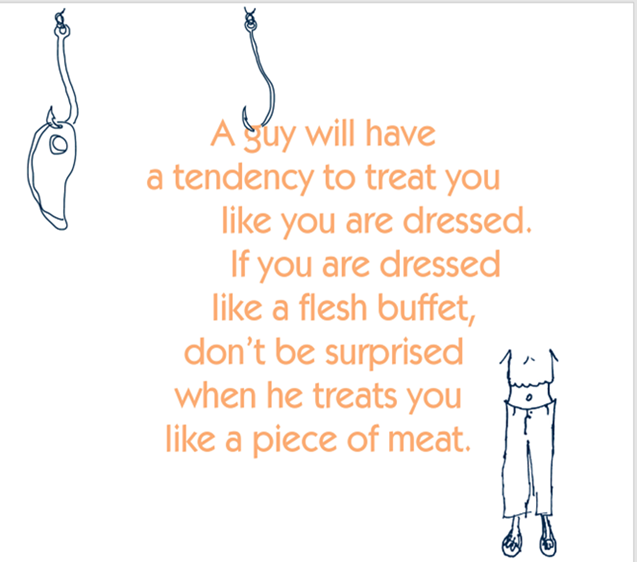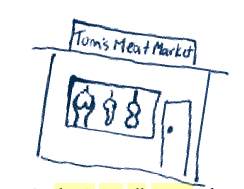This post is part of a series called“You Are Not Your Own,” focusing on rape and sexual assault in Christian relationship/dating books
Trigger Warning for rape, sexual assault, victim blaming, sexism
Note: this research mainly focused on female rape. Though it is not the focus of my project, male rape is a huge problem as well–1 out of every 10 rape victims is male. I wanted to make it clear that, despite the focus of my study, it is not only women (and definitely not only cisgender women) who face sexual violence.

I’m still working through the first of four significant findings that I came across while analyzing popular Christian dating books. For other posts related to this first finding, check out this post and this post.
1. An Environment Ripe for Rape Myth Acceptance
The tendency to dehumanize people by treating them as objects or animals strongly correlates with the tendency to accept rape myths (such as “She was asking for it by wearing that outfit”) as true. It also correlates with the tendency to actually commit rape or sexual assault. The Christian dating books I’ve analyzed dehumanized both women and–surprisingly–men. The authors of most of these books dehumanize men in ways that absolve them of responsibility for their actions (acting like that’s just how men are because of their animalistic nature), or in ways that use “bad” men (who can’t control their animal nature) as a threat to scare women into submitting to “good” men (who have learned, as the Driscolls say on p. 155 of Real Marriage, to let their “theology conquer [their] biology.”)
While the books dehumanize men in ways that put them in the role of aggressors and hunters, the dehumanization of women puts women in the role of prey, or objects to be won or bought.
Women are Weaker Animals, or Objects
The book Dateable is the worst on this front, and is constantly dehumanizing women. The book describes them as:
- Prey to be hunted by men (p. 182)
- Fish being hooked on bait (p. 82)
- Meat (p. 108, 110, 118)
- Uncharted territory for men to conquer (p. 182)
- Clothes for men to buy (p. 129)
I Kissed Dating Goodbye avoided dehumanizing language toward women, but Real Marriage and When God Writes Your Love Story also treated women as objects. The latter two books, however, reject the hostile, violent-sounding objectification present in Dateable (oh my god, that book talks about us being HUNTED) in favor of a more benevolent approach. For example, in Real Marriage, the Driscolls describe women as pieces of property, not to be conquered, but to be explored:
Too many men are more like conquerors than explorers. They get married—which is akin to landing on the beach of an unexplored land—yet fail to explore the landscape…Our wives do not want to be conquered; they want to be explored emotionally. (p. 51)
The Ludys, in When God Writes Your Love Story, talk about a woman as a “precious pearl of purity,” a “glistening, and untarnished gem,” or a “treasure” to be kept protected for her future husband (p. 118). Women who—by having sex or getting too emotionally involved with partners before marriage—are “careless with [their] treasure” (p. 99) are compared to “hamburger meat” (p. 100). With language that presents women as objects, prizes, prey, land, and food, these books strip women of their autonomy over their lives and bodies. Women become things that exist to please men, rather than people with their own desires and destinies.
While men’s dehumanization partially absolves them of responsibility for their actions, women’s dehumanization often puts a greater burden on them, holding them responsible for the way men treat them.
In When God Writes Your Love Story, women are told they can either be a treasure (for men to cherish and protect) or a piece of meat (for men to devour). In Dateable, dehumanization is often used as a hostile threat for women who transgress traditional gender roles. Let’s look at some images from the book:


The first image shows a drawing of a woman’s body (dressed in an “immodest” shirt that reveals her midriff), and of a steak stuck through a meat hook, next to the words, “…If you dress like a flesh buffet, don’t be surprised when he treats you like a piece of meat.” The second image is a drawing of a building called “Tom’s Meat Market.” In the window of the building are female torsos hanging from meat hooks.
The imagery is violent and threatening and the message is clear: stay in your appropriate gender role (by dressing modestly) or you get what’s coming to you (and what’s coming to you is violence, physical or otherwise) when men start to treat you as meat.











